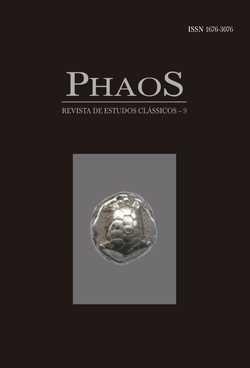A inutilidade dos homens. Considerações sobre a condição humana nos poemas homéricos e nos de Hesíodo
Keywords:
Greek mythology. Homeric poems. Hesiodic poems. Human condition.Abstract
Comparing the importance of work in greek, babilonian and semitic mythologies, I examine the particularity of greek conception of human nature as presented in its most ancient texts. I propose that the surprising absence of a myth about the criation of human race in the homeric poems and in those of Hesiod must be considered a significant characteristic of greek mythology.References
ANÔNIMO. Sobre o sublime. Edição, introdução e notas por D. A. Russell. Oxford: Oxford University Press, 1964.
AUBRIOT, D. Hymne et prière à travers Homère et quelques autres poètes: la démarche religieuse à l’époque archaïque. Entretiens sur l’Antiquité Gréco-Romaine. Liège: Université de Liège, 1996.
AUERBACH, E. Mimesis. A representação da realidade na literatura ocidental. Estudos – Crítica 2. Trad. por G. B. Sperber. São Paulo: Perspectiva, 19762.
BALDRY, H.C. The unity of mankind in Greek thought. Cambridge: Cambridge University Press, 1965.
BARCK, C. Wort und Tat bei Homer. Hindelsheim / New York: Olms, 1976.
BÍBLIA DE JERUSALÉM. São Paulo: Edições Paulinas, 1992
BOTTERO, J., KRAMER, S. Lorsque les dieux faisaient l’homme. Mythologie mésopotamienne. Paris: Gallimard, 1989.
BRANDÃO, J. As origens do homem (Hesíodo e o Atrahasis). In: DOURADO-LOPES, A. O., LAGE, C., FLORES, O. (Org.). Scripta Classica. História, Literatura e Filosofia na Antigüidade Clássica. Belo Horizonte: Faculdade de Letras da UFMG, 1999, p. 31-45.
BURKERT, W. Grieschiche Religion der archaischen und klassischen Epoche. Stuttgart / Berlin / Köln / Mainz: W. Kohlhammer, 1977.
CHANTRAINE, P. Dictionnaire étymologique de la langue grecque. Histoire des mots. Paris: Klincksieck, 19992.
CLAY, J. S. Hesiod's cosmos. Cambridge: Cambridge University Press, 2003.
DESCAT, R. L’acte et l’effort. Une idéologie du travail en Grèce ancienne (VIII – V siècle av. J.-C.). Besançon-Lille: Centre de Recherches d'Histoire Ancienne, 1986.
DUARTE, A. S. Laerte e o mundo do trabalho na Odisseia. Nuntius Antiquus, 3, pp. 3-13, 2009.
ELIADE, M. Eschatologie et cosmogonie. La fin du monde dans le passé et l'avenir. In: Aspects du mythe. Paris: Gallimard, 1963, pp. 71-94.
FINLEY, M. The world of Ulysses. New York: New York Review of Books, 2002.
FRÈRE, J. Ardeur et colère. Le thumos platonicien. Paris: Kimé, 2004.
FRIEDLÄNDER, P. Lachende Götter, Die Antike, 10, pp. 209-226, 1934 (reeditado em _________. Studien zur antiken Litteratur und Kunst, Berlin, 1969, pp. 3-18, 1969).
GRIFFIN, J. Homer on life and death. Oxford: Oxford ,University Press, 1980.
GUARDUCCI, M. Leggende dell’antica Grecia relative all’origine dell’umanità e analoghe tradizioni di altri paesi. Atti della Reale Accademia Nazionale dei Lincei, pp. 379-459, 1927.
HEITSCH, E. TLEMOSYNE. Hermes, 92, p. 257-264, 1964.
HESIOD. Works and days. Edição, introdução e notas, por M. L. West. Oxford: Clarendon Press, 1978.
JAEGER, Werner. Paideia. A formação do homem grego. Trad. por A. M. Parreira. São Paulo / Brasília: Martins Fontes / Universidade de Brasília, 1989.
KIRK, G. S. War and the warrior in the homeric poems. In: VERNANT, J.-P. (Org.). Problèmes de la guerre en Grèce ancienne. Civilisations et Sociétés 11. Paris / La Haye: Mouton & Co., 1968, pp. 93-117.
KIRK, G. S. The Iliad: a commentary. Volume II: books 5-8. Editor geral G. S. Kirk. Cambridge: Cambridge University Press, 1990.
KULLMANN, W. Das Wirken der Götter. Untersuchungen zur Frage der Entstehung des homerischen ‘Götterapparatts’. Berlin: Akademie Verlag, 1956.
LEFEBVRE, D. Capacité, force et puissance. Sur la genèse et les sens de la notion aristotélicienne de dynamis. Tese de Doutoramento em Filosofia. Paris: Universidade de Paris I, 2000.
LLOYD-JONES, H. The justice of Zeus. Berkeley: University of California, 1983; 1997.
MELE, A. Società e lavoro nei poemi omerici. Napoli: Università degli Studi di Napoli, 1968.
NILSSON, M. Geschichte der griechischen Religion. Munique: C. H. Beck’sche, 1955; 19673.
ONIANS, R. B. The origins of european thought. About the body, the mind, the soul, the world, time and fate. Cambridge: Cambridge University Press, 19542.
PUCCI, P. Ulysse polutropos. Lectures intertextuelles de l'Iliade et de l' 'Odyssée'. (Apparat Critique, 15). Trad. par J. Routier-Pucci. Lille: Presses Universitaires du Septentrion, 1995.
REINHARDT, K. Tradition und Geist im homerischen Epos. In: _________. Tradition und Geist. Gesammelte Essays zur Dichtung. Organização por C. Becker. Göttingen: Vandenhœck und Ruprecht, pp. 5-11, 1960.
REINHARDT, K. Das Parisurteil. In: _________. Tradition und Geist. Gesammelte Essays zur Dichtung. Organização por C. Becker. Göttingen: Vandenhœck und Ruprecht, pp. 16-36, 1960.
RICHARDSON, N. The Iliad: a commentary. Vol. VI: books XXI-XXIV. Cambridge: Cambridge University Press, 1993.
SAÏD, S. Les crimes des prétendants, la maison d'Ulysse et les festins de l'Odisseia. In: SAÏD, S., DESBORDES, F., BOUFFARTIGUE, J., MOREAU, A. (Org.). Etudes de littérature ancienne. Homère, Horace, le mythe d'Œdipe, les 'Sentences de Sextus'. Paris: Presses de l'École Normale Supérieure, 1979, p. 9-49.
STRAUSS, L. Jerusalem and Athens. In: Studies in platonic political philosophy. Chicago / London: Chicago University Press, 1983, p. 147-173.
VERNANT, J.-P. Mortels et immortels: le corps divin. In: _____________. L’individu, la mort, l’amour. Soi-même et l’autre en Grèce ancienne. Paris: Gallimard, Paris, 19992, p. 17-19.
VON TROJAN, F. v. Handlungstypen im Epos. Die Homerische 'Ilias'. Munique: Max Hüber, 1928.
VIAN, F. La fonction guerrière dans la mythologie grecque. In: VERNANT, J.-P. (Org.). Problèmes de la guerre en Grèce ancienne. Civilisations et Sociétés 11. Paris / La Haye: Mouton & Co., 1968, p. 53-68.
WEST, M. L. “The rise of the greek Epic”, Journal of Hellenic Studies, 108, 1988, p. 151-172.
WEST, M. L. The east side of Helicon. West asiatic elements in Greek poetry and myth. Oxford: Oxford University Press, 1997.
Downloads
Published
Issue
Section
License
When submitting papers to PhaoS, authors should be aware that PhaoS shall hold all relevant copyrights over such papers if they are accepted for publication. Manuscripts will not be returned.

